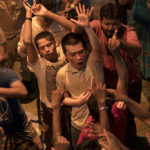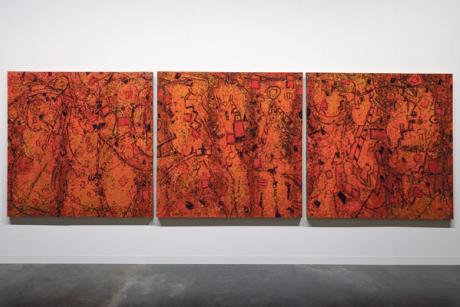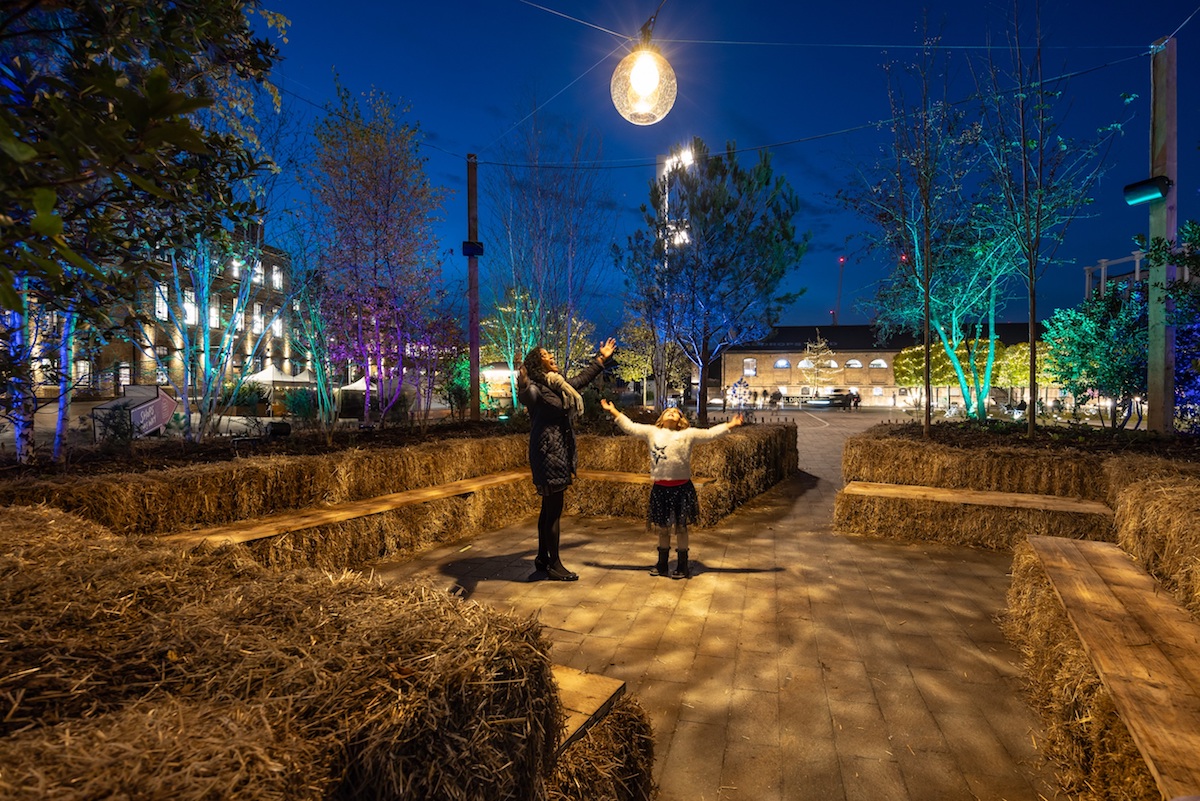2013.10.20 Kesen-cho
- Photography (Photography)
Naoya Hatakeyama
Naoya Hatakeyama’s series Rikuzentakata (2011) documents the devastating aftermath of the 2011 Tohoku earthquake and tsunami in Japan. Throughout the series of sixty C-prints (five of which are included in the Kadist Art Foundation’s collection), Hatakeyama’s photographs depict scenes of torn landscapes and leveled homes, demolished villages and massive piles of detritus pummeled beyond recognition. The images serve as records of disaster, seemingly driven by an intense need to bear witness to collective trauma. Hatakeyama’s photographs, however, emerged from a painful and personal grief: the series focuses on the near-destruction of the artist’s hometown, an event which resulted in both his mother’s death and the deaths of many friends and neighbors. Rikuzentakata bears the ethical weight and responsibility of photojournalism even as its genesis comes out of a deeply felt loss and the ambiguity of survivor’s guilt. But for every desolate landscape on view in Rikuzentakata , Hatakeyama also offers glimpses of possible regeneration and hope: in 2013.10.20 Kesen-cho (2013), a forest of evergreen trees suggests the possibility for new growth amongst an overturned and muddied hillside, while a faint rainbow streaking across the sky in 2012.3.24 Kesen-cho (2013) offers a familiar but poetic gesture towards a better future. Hatakeyama suggests that what’s lost can never be fully recovered, but that with time, those wounds can slowly heal and life can begin again.
Naoya Hatakeyama is one of Japan’s leading contemporary photographers. His work frequently explores the relationship between natural and built environments, and he is particularly invested in examining how urbanization produces violent effects in surrounding landscapes. In 2012, Hatakeyama was the subject of a mid-career retrospective at SFMOMA titled Naoya Hatakeyama: Natural Stories, an exhibition of large-scale photographs centered around themes of nature, destruction, and human will. His photographs have been acquired by many international collections such as the National Museum of Modern Art, Osaka; the National Museum of Modern Art, Tokyo; Tokyo Metropolitan Museum of Photography; the Museum of Fine Arts, Houston; Yale University Art Gallery, New Haven; the Swiss Foundation for Photography, Winterthur; la Maison Européenne de la Photographie, Paris; and the Victoria & Albert Museum, London.
Colors:
Related works sharing similar palette

© » ARTS EQUATOR
Weekly Southeast Asia Radar: Vietnam's new costume institute; Is Penang's art scene dead? | ArtsEquator Thinking and Talking about Arts and Culture in Southeast Asia ArtsEquator Radar Jitti Chompee October 22, 2019 ArtsEquator’s Southeast Asia Radar features articles and posts about arts and culture in Southeast Asia, drawn from local and regional websites and publications – aggregated content from outside sources, so we are exposed to a multitude of voices in the region...

© » LONDONIST
How To Spend Christmas 2023 In London | Londonist Christmas In London 2023: A Guide To Festive Events, Food And Drink In The Capital This Winter By Londonist Londonist Christmas In London 2023: A Guide To Festive Events, Food And Drink In The Capital This Winter The 2023 Oxford Street Christmas lights...

© » ARTNEWS MARKET
New York’s Cheim & Read Gallery to Close After 26 Years – ARTnews.com Skip to main content By Maximilíano Durón Plus Icon Maximilíano Durón Senior Editor, ARTnews View All November 22, 2023 2:53pm An installation shot of several paintings from "The Americans," a 2023 exhibition by Cumwizard69420 at Cheim & Read in New York...

© » KADIST
Diego Marcon
2015The video animation Falling Head 2 , hand-painted by Diego Marcon in 2015, consists of a close-up of a head caught on the threshold between sleep and wakefulness or maybe from wakefulness to sleep...

© » ARTS EQUATOR
Interview with Wang Chong for "Made In China 2.0" | ArtsEquator Thinking and Talking about Arts and Culture in Southeast Asia Articles Mark Pritchard March 23, 2020 The following review is made possible through a Critical Residency programme supported by By Nabilah Said (1,000 words, 6-minute read) Experimental Chinese theatremaker Wang Chong presented a work-in-progress showing of his newest work, Made in China 2.0 , at Asia TOPA in February...

© » ARTS EQUATOR
"A Land Imagined" and The Ghosts We Forget | ArtsEquator Thinking and Talking about Arts and Culture in Southeast Asia Articles Photo courtesy of Akanga Film Asia & Philipp Aldrup Photography Photo courtesy of Akanga Film Asia & Philipp Aldrup Photography February 21, 2019 By Alfonse Chiu (1200 words, six-minute read) The three definitions of the word “ghost” from the Oxford dictionary are as follows: the first, “an apparition of a dead person which is believed to appear or become manifest to the living”; the second, “a slight trace or vestige of something”; and the third, “a faint secondary image caused by a fault in an optical system, duplicate signal transmission, etc.” In all three, presence is a suggestion of memory, amenable to corrections by means of a quick scrub of one’s spectacles...

© » KADIST
Cauleen Smith
2018Set to the iconic and spiritual music of Alice Coltrane’s Turiyasangitananda (1937–2007), Cauleen Smith’s film Sojourner travels across the US to visit a series of sites important to an alternative and creative narrative of black history...

© » KADIST
Kudzanai-Violet Hwami
2019This painting is the direct result of the artist’s research into her roots...

© » THEARTNEWSPER
In pictures: Art Basel in Miami Beach's Meridians section features big works tackling big topics Art market Museums & heritage Exhibitions Books Podcasts Columns Technology Adventures with Van Gogh Search Search Art Basel in Miami Beach 2023 feature In pictures: Art Basel in Miami Beach's Meridians section features big works tackling big topics Curator Magalí Arriola picks out some highlights from the fair's large-scale presentation Elena Goukassian 9 December 2023 Share Lee Mullican, Entrance of the Entertainers (1984-85) Liliana Mora Although this year’s Meridians section at Art Basel in Miami Beach lacks an official theme, many of its large-scale works reference some sort of metaphorical largeness—whether global connectivity, the environment or the universal language of music...

© » KADIST
Donna Conlon and Jonathan Harker
2012In Tapitapultas (2012), Donna Conlon and Jonathan Harker comment on mass consumerism and pollution by way of a game they invented...

© » MODERN MET ART
15 Art Installations Inspired by the Desert Pop Up in Saudi Arabia Home / Art / Installation 15 Art Installations Inspired by the Desert Pop Up in Saudi Arabia By Jessica Stewart on February 9, 2024 “Reveries” by Rana Haddad and Pascal Hachem For the third time, the Saudi desert is being transformed into an open-air art gallery thanks to Desert X AlUla ...

© » SLASH PARIS
Jean-Charles de Quillacq — Les poulains deviennent des chevaux — Galerie Marcelle Alix — Exposition — Slash Paris Connexion Newsletter Twitter Facebook Jean-Charles de Quillacq — Les poulains deviennent des chevaux — Galerie Marcelle Alix — Exposition — Slash Paris Français English Accueil Événements Artistes Lieux Magazine Vidéos Retour Précédent Suivant Jean-Charles de Quillacq — Les poulains deviennent des chevaux Exposition Techniques mixtes Jean-Charles de Quillacq, Ouverte (Discomfort), 2023 (Détail) Collage et acetone sur poster — 59,7 × 80 cm Courtesy de l’artiste et galerie Marcelle Alix, Paris Jean-Charles de Quillacq Les poulains deviennent des chevaux Encore 27 jours : 11 janvier → 9 mars 2024 « J’étais un morceau d’usine pour l’éternité...

© » ART & OBJECT
See What Sold at the Barbara Walters Estate Sale at Bonhams | Art & Object Skip to main content Subscribe to our free e-letter! Webform Your Email Address Role Art Collector/Enthusiast Artist Art World Professional Academic Country USA Afghanistan Albania Algeria American Samoa Andorra Angola Anguilla Antarctica Antigua & Barbuda Argentina Armenia Aruba Ascension Island Australia Austria Azerbaijan Bahamas Bahrain Bangladesh Barbados Belarus Belgium Belize Benin Bermuda Bhutan Bolivia Bosnia & Herzegovina Botswana Bouvet Island Brazil British Indian Ocean Territory British Virgin Islands Brunei Bulgaria Burkina Faso Burundi Cambodia Cameroon Canada Canary Islands Cape Verde Caribbean Netherlands Cayman Islands Central African Republic Ceuta & Melilla Chad Chile China Christmas Island Clipperton Island Cocos (Keeling) Islands Colombia Comoros Congo - Brazzaville Congo - Kinshasa Cook Islands Costa Rica Croatia Cuba Curaçao Cyprus Czechia Côte d’Ivoire Denmark Diego Garcia Djibouti Dominica Dominican Republic Ecuador Egypt El Salvador Equatorial Guinea Eritrea Estonia Eswatini Ethiopia Falkland Islands Faroe Islands Fiji Finland France French Guiana French Polynesia French Southern Territories Gabon Gambia Georgia Germany Ghana Gibraltar Greece Greenland Grenada Guadeloupe Guam Guatemala Guernsey Guinea Guinea-Bissau Guyana Haiti Heard & McDonald Islands Honduras Hong Kong SAR China Hungary Iceland India Indonesia Iran Iraq Ireland Isle of Man Israel Italy Jamaica Japan Jersey Jordan Kazakhstan Kenya Kiribati Kosovo Kuwait Kyrgyzstan Laos Latvia Lebanon Lesotho Liberia Libya Liechtenstein Lithuania Luxembourg Macao SAR China Madagascar Malawi Malaysia Maldives Mali Malta Marshall Islands Martinique Mauritania Mauritius Mayotte Mexico Micronesia Moldova Monaco Mongolia Montenegro Montserrat Morocco Mozambique Myanmar (Burma) Namibia Nauru Nepal Netherlands Netherlands Antilles New Caledonia New Zealand Nicaragua Niger Nigeria Niue Norfolk Island Northern Mariana Islands North Korea North Macedonia Norway Oman Outlying Oceania Pakistan Palau Palestinian Territories Panama Papua New Guinea Paraguay Peru Philippines Pitcairn Islands Poland Portugal Puerto Rico Qatar Romania Russia Rwanda Réunion Samoa San Marino Saudi Arabia Senegal Serbia Seychelles Sierra Leone Singapore Sint Maarten Slovakia Slovenia Solomon Islands Somalia South Africa South Georgia & South Sandwich Islands South Korea South Sudan Spain Sri Lanka St...







